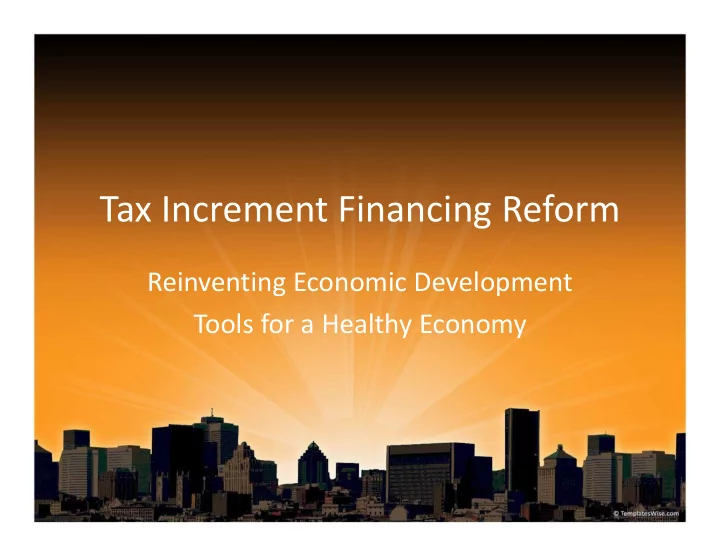

Tax Increment Financing Reform Reinventing Economic Development Tools for a Healthy Economy
Reflection and review • Original TIF programs have been operating for decades. • Growing concerns raised from legislators. • Long ‐ term fiscal impact on taxing jurisdictions.
Workgroup Background • Rep. Kowall assembled a workgroup to review and make recommendations regarding our TIF programs. • The workgroup met over six weeks, discussing a number of key concepts on the existing TIF programs and other economic development tools.
Workgroup Participants • House Staff: Kari Bearman, Jeremy Hendges, Craig Ryan and Travis Weber. • Governor’s Staff: Sally Durfee, Nat Forstner, Andrew Haan, Bill Rustem and Howard Ryan • Local Gov’t: Judy Allen, Deena Bosworth, Nikki Brown and Samantha Harkins • Other Experts: Nick Khouri, Doug Luciani, Eric Lupher, Doug Roberts Sr., Eric Scorsone and Scott Smith
Workgroup Programs Reviewed Tax Increment Finance Authority Act • Downtown Development Authority • • Convention Facility Act Authority Act Local Development Financing Act • Neighborhood TIFA • • Principal Shopping Historic Neighborhood TIFA • District Water Resource Improvement TIFA • Brownfield Redevelopment • • Business Improvement Authority Act Zones Corridor Improvement Authority Act • Private Investment Financing Act • Nonprofit Street Railway Act •
Workgroup Themes • Consolidation. • Dynamic and able to evolve. • Restore TIF to original intent. • Increase transparency. • Eliminate duplication of services. • Share in the success.
Proposed Legislation Highlights • Consolidates numerous TIF programs into a significantly revamped DDA Act. • Phases out TIFAs, LDFAs, Corridor Improvement Authorities and Water Resource. • Eliminates Neighborhood TIFs, Historic Neighborhood TIFs and PIFAs. • Brownfield Act and Nonprofit Railway Act remain intact.
Proposed Legislation Highlights • Expands flexibility on purpose and use of resources. • Incorporates special assessments identical to Principal Shopping Districts. • Incorporates Brownfield activities.
Proposed Legislation Highlights • Eliminates citizens council. • Annual public hearing for stakeholder input. • Required reporting to the local municipality and state government on key information. • Report information must be available online for public access. • Failure to comply could result in loss of funds.
Proposed Legislation Highlights • Eliminates duplication of expected municipal services. • Allows for additional services that may be required by events or are beyond the level provided by the municipality.
Proposed Legislation Highlights • Restricts TIF revenue to strictly infrastructure projects. • Generally prohibits TIF revenue for operational and non ‐ capital expenses. • Funding for operational and non ‐ capital expenses would be through assessments or millages.
Proposed Legislation Highlights • Incorporates a gain ‐ sharing component to TIF revenue to help tax jurisdictions enjoy the success of the program. • Limits TIF capture to existing millages, though new millages could be captured through a new TIF plan.
Proposed Legislation Highlights • Allows TIF revenue to be saved for projects – but if it is not used in a set time period, finances would flow back to taxing jurisdiction. • School tax capture only for Brownfield ‐ related work.
Proposed Legislation Highlights • Proposed legislation is meant as a starting point for the discussion – not a final product. • Feedback is welcome and encouraged. • Looking forward to working through the legislative process to continue to develop the proposal.
Moving Forward • Legislation as outlined will be introduced this week. • Proposed legislation will be referred to the Commerce Committee. • Public discussion and vetting through the committee process. • Commitment to ongoing discussion and refinement.
Proposed Timeline • Bill introduction this week. • Committee discussion and review throughout September. • House floor discussion beginning of October. • Goal is to build consensus and enact reforms by the end of the year.
Contact Info • Jeremy Hendges: jhendges@house.mi.gov 517 ‐ 303 ‐ 6026 • Craig Ryan cryan@house.mi.gov 517 ‐ 373 ‐ 3100 • Travis Weber tweber@house.mi.gov 517 ‐ 373 ‐ 3100 • Kari Bearman kbearman@house.mi.gov 517 ‐ 373 ‐ 2616
Recommend
More recommend